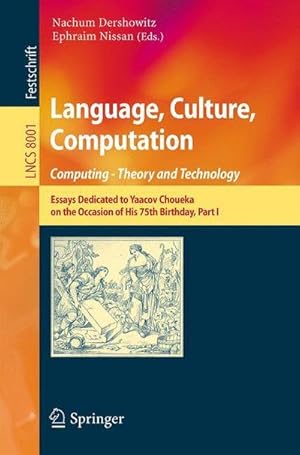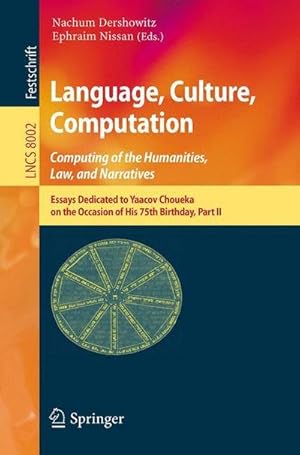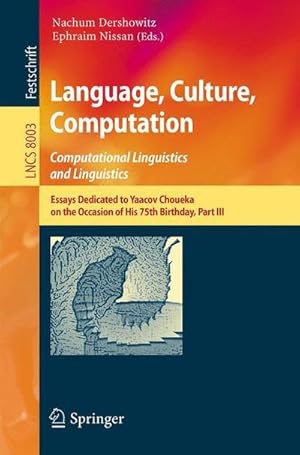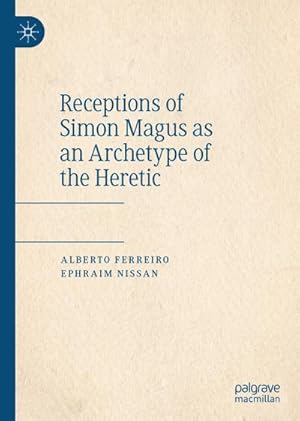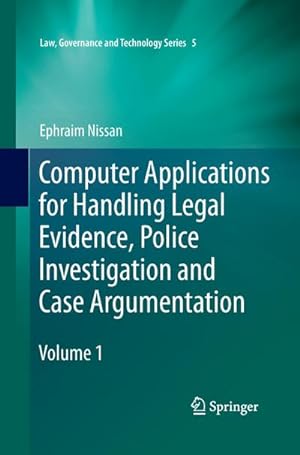ephraim nissan (6 Ergebnisse)
Produktart
- Alle Produktarten
- Bücher (6)
- Magazine & Zeitschriften
- Comics
- Noten
- Kunst, Grafik & Poster
- Fotografien
- Karten
-
Manuskripte &
Papierantiquitäten
Zustand
- Alle
- Neu
- Antiquarisch/Gebraucht
Einband
Weitere Eigenschaften
- Erstausgabe
- Signiert
- Schutzumschlag
- Angebotsfoto
Land des Verkäufers
Verkäuferbewertung
-
Language, Culture, Computation: Computing - Theory and Technology : Essays Dedicated to Yaacov Choueka on the Occasion of His 75 Birthday, Part I
Verlag: Springer Berlin Heidelberg, 2014
ISBN 10: 3642453201ISBN 13: 9783642453205
Anbieter: AHA-BUCH GmbH, Einbeck, Deutschland
Buch
Taschenbuch. Zustand: Neu. Druck auf Anfrage Neuware - Printed after ordering - This Festschrift volume is published in Honor of Yaacov Choueka on the occasion of this 75th birthday. The present three-volumes liber amicorum, several years in gestation, honours this outstanding Israeli computer scientist and is dedicated to him and to his scientific endeavours. Yaacov's research has had a major impact not only within the walls of academia, but also in the daily life of lay users of such technology that originated from his research. An especially amazing aspect of the temporal span of his scholarly work is that half a century after his influential research from the early 1960s, a project in which he is currently involved is proving to be a sensation, as will become apparent from what follows. Yaacov Choueka began his research career in the theory of computer science, dealing with basic questions regarding the relation between mathematical logic and automata theory. From formal languages, Yaacov moved to natural languages. He was a founder of natural-language processing in Israel, developing numerous tools for Hebrew. He is best known for his primary role, together with Aviezri Fraenkel, in the development of the Responsa Project, one of the earliest fulltext retrieval systems in the world. More recently, he has headed the Friedberg Genizah Project, which is bringing the treasures of the Cairo Genizah into the Digital Age. This first part of the three-volume set covers a range of topics in computer science. The papers are grouped in topical sections on: the jubilaris: Yaacov and his oeuvre; theory of computation; science computing and tools for engineering; information retrieval.
-
Language, Culture, Computation: Computing for the Humanities, Law, and Narratives : Essays Dedicated to Yaacov Choueka on the Occasion of His 75 Birthday, Part II
Verlag: Springer Berlin Heidelberg, 2014
ISBN 10: 3642453236ISBN 13: 9783642453236
Anbieter: AHA-BUCH GmbH, Einbeck, Deutschland
Buch
Taschenbuch. Zustand: Neu. Druck auf Anfrage Neuware - Printed after ordering - This Festschrift volume is published in Honor of Yaacov Choueka on the occasion of this 75th birthday. The present three-volumes liber amicorum, several years in gestation, honours this outstanding Israeli computer scientist and is dedicated to him and to his scientific endeavours. Yaacov's research has had a major impact not only within the walls of academia, but also in the daily life of lay users of such technology that originated from his research. An especially amazing aspect of the temporal span of his scholarly work is that half a century after his influential research from the early 1960s, a project in which he is currently involved is proving to be a sensation, as will become apparent from what follows. Yaacov Choueka began his research career in the theory of computer science, dealing with basic questions regarding the relation between mathematical logic and automata theory. From formal languages, Yaacov moved to natural languages. He was a founder of natural-language processing in Israel, developing numerous tools for Hebrew. He is best known for his primary role, together with Aviezri Fraenkel, in the development of the Responsa Project, one of the earliest fulltext retrieval systems in the world. More recently, he has headed the Friedberg Genizah Project, which is bringing the treasures of the Cairo Genizah into the Digital Age.This second part of the three-volume set covers a range of topics related to the application of information technology in humanities, law, and narratives. The papers are grouped in topical sections on: humanities computing; narratives and their formal representation; history of ideas: the numerate disciplines; law, computer law, and legal computing.
-
Language, Culture, Computation: Computational Linguistics and Linguistics : Essays Dedicated to Yaacov Choueka on the Occasion of His 75 Birthday, Part III
Verlag: Springer Berlin Heidelberg, 2014
ISBN 10: 3642453260ISBN 13: 9783642453267
Anbieter: AHA-BUCH GmbH, Einbeck, Deutschland
Buch
Taschenbuch. Zustand: Neu. Druck auf Anfrage Neuware - Printed after ordering - This Festschrift volume is published in Honor of Yaacov Choueka on the occasion of this 75th birthday. The present three-volumes liber amicorum, several years in gestation, honours this outstanding Israeli computer scientist and is dedicated to him and to his scientific endeavours. Yaacov's research has had a major impact not only within the walls of academia, but also in the daily life of lay users of such technology that originated from his research. An especially amazing aspect of the temporal span of his scholarly work is that half a century after his influential research from the early 1960s, a project in which he is currently involved is proving to be a sensation, as will become apparent from what follows. Yaacov Choueka began his research career in the theory of computer science, dealing with basic questions regarding the relation between mathematical logic and automata theory. From formal languages, Yaacov moved to natural languages. He was a founder of natural-language processing in Israel, developing numerous tools for Hebrew. He is best known for his primary role, together with Aviezri Fraenkel, in the development of the Responsa Project, one of the earliest fulltext retrieval systems in the world. More recently, he has headed the Friedberg Genizah Project, which is bringing the treasures of the Cairo Genizah into the Digital Age. This third part of the three-volume set covers a range of topics related to language, ranging from linguistics to applications of computation to language, using linguistic tools. The papers are grouped in topical sections on: natural language processing; representing the lexicon; and neologisation.
-
Receptions of Simon Magus as an Archetype of the Heretic
Verlag: Springer International Publishing, 2023
ISBN 10: 3031125223ISBN 13: 9783031125225
Anbieter: AHA-BUCH GmbH, Einbeck, Deutschland
Buch
Buch. Zustand: Neu. Druck auf Anfrage Neuware - Printed after ordering - This book about receptions of Simon Magus uncovers further facets of one who was held to be the evil archetype of heretics. Ephraim Nissan and Alberto Ferreiro explore how Simon Magus has been represented in text, visual art, and music. Special attention is devoted to the late medieval Catalan painter Lluís Borrassà and the Italian librettist and musician Arrigo Boito. The tradition of Simon Magus' demonic flight, ending in his crashing down, first appears in the patristic literature. The book situates that flight typologically across cultures. Fascinating observations emerge, as the discussion spans flight of the wicked in rabbinic texts, flight and death of King Lear's father and a Soviet-era Buryat Buddhist monk, flight and doom of the fool in an early modern German broadsheet, and more. The book explains and moves beyond extant scholarly wisdom on how the polemic against Mani (the founder of Manichaeism) was tinged with hues of Simon Magus. The novelty of this book is that it shows that Simon Magus' receptions teach us a great deal about the contexts in which this archetype was deployed.
-
Computer Applications for Handling Legal Evidence, Police Investigation and Case Argumentation
Verlag: Springer Netherlands, 2012
ISBN 10: 9048189896ISBN 13: 9789048189892
Anbieter: AHA-BUCH GmbH, Einbeck, Deutschland
Buch
Buch. Zustand: Neu. Druck auf Anfrage Neuware - Printed after ordering - This book provides an overview of computer techniques and tools - especially from artificial intelligence (AI) - for handling legal evidence, police intelligence, crime analysis or detection, and forensic testing, with a sustained discussion of methods for the modelling of reasoning and forming an opinion about the evidence, methods for the modelling of argumentation, and computational approaches to dealing with legal, or any, narratives. By the 2000s, the modelling of reasoning on legal evidence has emerged as a significant area within the well-established field of AI & Law. An overview such as this one has never been attempted before. It offers a panoramic view of topics, techniques and tools. It is more than a survey, as topic after topic, the reader can get a closer view of approaches and techniques. One aim is to introduce practitioners of AI to the modelling legal evidence. Another aim is to introduce legal professionals, as well as the more technically oriented among law enforcement professionals, or researchers in police science, to information technology resources from which their own respective field stands to benefit. Computer scientists must not blunder into design choices resulting in tools objectionable for legal professionals, so it is important to be aware of ongoing controversies. A survey is provided of argumentation tools or methods for reasoning about the evidence. Another class of tools considered here is intended to assist in organisational aspects of managing of the evidence. Moreover, tools appropriate for crime detection, intelligence, and investigation include tools based on link analysis and data mining. Concepts and techniques are introduced, along with case studies. So are areas in the forensic sciences. Special chapters are devoted to VIRTOPSY (a procedure for legal medicine) and FLINTS (a tool for the police). This is both an introductory book (possibly a textbook), and a reference for specialists fromvarious quarters.
-
Computer Applications for Handling Legal Evidence, Police Investigation and Case Argumentation
Verlag: Springer Netherlands, 2016
ISBN 10: 9402405186ISBN 13: 9789402405187
Anbieter: AHA-BUCH GmbH, Einbeck, Deutschland
Buch
Taschenbuch. Zustand: Neu. Druck auf Anfrage Neuware - Printed after ordering - This book provides an overview of computer techniques and tools ¿ especially from artificial intelligence (AI) ¿ for handling legal evidence, police intelligence, crime analysis or detection, and forensic testing, with a sustained discussion of methods for the modelling of reasoning and forming an opinion about the evidence, methods for the modelling of argumentation, and computational approaches to dealing with legal, or any, narratives. By the 2000s, the modelling of reasoning on legal evidence has emerged as a significant area within the well-established field of AI & Law. An overview such as this one has never been attempted before. It offers a panoramic view of topics, techniques and tools. It is more than a survey, as topic after topic, the reader can get a closer view of approaches and techniques.One aim is to introduce practitioners of AI to the modelling legal evidence. Another aim is to introduce legal professionals, as well as the more technically oriented among law enforcement professionals, or researchers in police science, to information technology resources from which their own respective field stands to benefit. Computer scientists must not blunder into design choices resulting in tools objectionable for legal professionals, so it is important to be aware of ongoing controversies. A survey is provided of argumentation tools or methods for reasoning about the evidence. Another class of tools considered here is intended to assist in organisational aspects of managing of the evidence.Moreover, tools appropriate for crime detection, intelligence, and investigation include tools based on link analysis and data mining. Concepts and techniques are introduced, along with case studies. So are areas in the forensic sciences. Special chapters are devoted to VIRTOPSY (a procedure for legal medicine) and FLINTS (a tool for the police). This is both an introductory book (possibly a textbook), and a reference for specialists fromvarious quarters.


